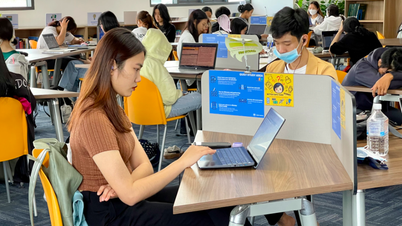(Dan Tri) - A psychologist reveals 3 skills for both parents and children to use their phones effectively, without becoming addicted to their phones and wasting time.
American psychologist Jenny Woo says that phones are one of the reasons why many relationships suddenly become bland. Maybe while sitting with relatives or friends, you are constantly scrolling through your phone, instead of focusing on the conversation.
Small things like this can easily affect relationships, because the other person feels disrespected while sharing their story.
According to psychologist Jenny Woo, constantly using the phone when with relatives and friends weakens the bond in the relationship and reduces trust. Even the person who is ignored in the conversation can feel lonely, insecure, sad...
In today's life, using the phone requires a high level of self-awareness to be able to behave well. Below are 3 skills that parents can apply to themselves and their children in using the phone, so that the whole family has healthy and effective phone usage habits.
Have a specific purpose before you start "surfing" your phone

Parents need to help their children form a culture of using phones early (Photo: Freepik).
Parents should help their children learn to clearly define their purpose before they start "surfing" their phones, determine both when and how to use them, and avoid using them too much just to feel relieved. To reduce the feeling of "craving" to use the phone, reduce the need to constantly check the phone, parents and children need to set clear rules of conduct to follow together.
For example, when children are having a meal with their family, they will leave their phones in another room, or put them on silent mode. They will wait until the meal is over to check their phones.
If your child is in the middle of a conversation and needs to show attention, but suddenly remembers something to do on the phone, he or she will write it down in a notebook to remember and deal with after the conversation ends.
If I really need to use my phone during a conversation, I will quickly explain to the other person what I need to do urgently, so they can sympathize and feel respected.
As soon as you realize you're looking at your phone instead of paying attention to the person you're talking to, you should immediately put the phone out of sight, such as in your bag.
If you are the parent who makes this mistake while you are with your child, take it seriously and say, "I'm sorry, let's focus on the story now."
Actively keep your phone out of sight

To get quality connections, we need to know when to put our phones aside (Photo: Freepik).
Many studies have shown that simply keeping your phone within reach, even if it doesn't make a notification sound, will still reduce your ability to concentrate, affecting your cognitive ability.
To achieve mental freedom, not being "manipulated" by the phone, not being tempted to use it, to improve learning efficiency, parents need to guide their children to know how to create distance between themselves and the phone. The purpose is to reduce distractions and increase the ability to concentrate.
For example, children need to know how to put their phones in their bags, drawers, or in another room when they have work to focus on.
In fact, there will be times when discipline and self-control will decline. At this time, the distance actively created with the phone will help children not use the phone uncontrollably.
It is these seemingly simple measures that are effective in ensuring concentration and minimizing distraction.
Know how to disconnect

The culture of using phones needs to be formed first in the family (Photo: Freepik).
Receiving a notification on our phone puts our brains in a state of excitement. When we are in this state, it is very difficult to focus. It takes us an average of 23 minutes of effort to focus again.
Distractions prevent us from learning, working effectively, and creating meaningful, quality interactions. We may even be so distracted that we don’t even realize the problem.
It is important to control your mental state. Each of us must learn to actively stop using our phones at appropriate times of the day. By doing so, we will be able to control our ability to concentrate.
To minimize distractions caused by your phone, turn off unimportant notifications and put your phone on "Do Not Disturb" mode when you need to concentrate.
Families also need to set rules about times and places where phones are not used, such as during family meals or before bedtime.
When you welcome family, friends, or colleagues over, make sure they have a quality connection with your family, so your children see that everything that happens in the home is consistent.
Overall, by being clear about what we pick up our phones for, setting limits on our usage habits, and controlling our phone notifications, we can reduce our phone addiction, improve our focus on studying, working, and making quality connections.
Source: https://dantri.com.vn/giao-duc/3-ky-nang-su-dung-dien-thoai-ca-cha-me-va-con-cai-nen-thuc-hien-ngay-20241205153000127.htm


![[Photo] More than 17,000 candidates participate in the 2025 SPT Competency Assessment Test of Hanoi National University of Education](https://vphoto.vietnam.vn/thumb/1200x675/vietnam/resource/IMAGE/2025/5/17/e538d9a1636c407cbb211b314e6303fd)
![[Photo] National conference to disseminate and implement Resolution No. 66-NQ/TW and Resolution No. 68-NQ/TW of the Politburo](https://vphoto.vietnam.vn/thumb/1200x675/vietnam/resource/IMAGE/2025/5/18/adf666b9303a4213998b395b05234b6a)


![[Photo] General Secretary To Lam visits exhibition of achievements in private economic development](https://vphoto.vietnam.vn/thumb/1200x675/vietnam/resource/IMAGE/2025/5/18/1809dc545f214a86911fe2d2d0fde2e8)





























![[Photo] Prime Minister Pham Minh Chinh chairs meeting on science and technology development](https://vphoto.vietnam.vn/thumb/1200x675/vietnam/resource/IMAGE/2025/5/17/ae80dd74c384439789b12013c738a045)





























































Comment (0)